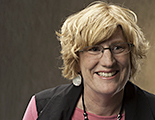
Carol Linder
Las Vegas, N.M. — Three outstanding New Mexico Highlands University biology graduates went on to complete their doctoral degrees in 2012.
Larry Agbor earned his Ph.D. in biomedical sciences from the University of New Mexico, Landry Nfonsam earned his Ph.D. in cell and organismal biology from New Mexico State University, and Valentine Agbor, no relation to Larry, earned his Ph.D. in molecular and integrative physiology from the University of Kansas Medical Center. All three are from Cameroon.
Highlands University biology professor Carol Linder advised all three students for their master’s degree research, and all were research assistants in her reproductive biology lab.
“These three Cameroonian students established a very high standard of expertise and professionalism in my lab that continues to this day,” Linder said. “Each one has tremendous potential to make significant scientific advances in their areas of research and are strong role models. I’m so proud of them.”
Agbor, Nfonsam, and Agbor are part of a contingent of Cameroonian students drawn to Highlands over the years by affordable tuition, research opportunities, and the fact that fellow Cameroonians study at the university.
“I’m exposing my graduate students to the type of research that is conducted at major research institutions. The fact that they are so successful at the doctoral level is extremely rewarding, and validates what we’re doing here at Highlands,” Linder said.
Linder joined the Highlands University faculty in 2004 and set up her lab, with a research focus on understanding sperm development and causes of male infertility using mouse genetics. Since then, more than 60 percent of her former graduate students have either completed their Ph.D.s or are in doctoral programs.
Larry Agbor, 34, is in a postdoctoral research fellowship at the Department of Pharmacology in the University of Iowa Carver College of Medicine. His doctoral dissertation research studied how Omega 3s in fish oil metabolize when administered to mice, improving vascular function and reducing high blood pressure, with implications for humans.
“It was in Dr. Linder’s lab that I became interested in working with mice to investigate mechanisms of human diseases,” Larry Agbor said. “I learned about genetics, molecular biology, and developmental biology, which prepared me for the Ph.D. program at UNM.
“Dr. Linder transformed my life 100 percent. I think she believes in her heart that education is the passport to opportunity, and she encourages all her graduate students to pursue doctoral programs,” Agbor said.
Nfonsam, 31, defended his dissertation successfully in October and is weighing postdoctoral fellowship offers. For his dissertation research, he examined how cells make the decision to develop eye tissue, identifying a new gene important to the process. Nfonsam used the common fruit fly, Drosophila, in his research because it has similar pathways and genes for eye development as humans.
“I believe I’m where I am today because of the springboard Dr. Linder provided in her lab, where I got a good foundation in molecular biology, microscopy and cell biology,” Nfonsam said.
“Dr. Linder inspired and encouraged me, helping me push forward. There’s not a word big enough for how thankful I am. In a small university like Highlands, there’s a culture of one-to-one interaction with your professors, which is key to learning.”
In January 2013, Valentine Agbor, 34, will begin a postdoctoral fellowship at the University of Kansas Medical Center. For his dissertation, Agbor studied the pathways by which select proteins regulate the development of germ cells in mouse testes, with implications for human male birth control.
“In Dr. Linder’s lab, I learned the critical thinking necessary for formulating research hypotheses and executing good research projects,” Valentine Agbor said. “The hands-on experience working with mice and learning molecular techniques were very valuable.
“I’m forever grateful for the leadership, friendship and support Dr. Linder and the other biology professors at Highlands gave me. The international office was also invaluable, especially Tina Clayton. My experience at Highlands was very rewarding and will stay with me wherever I go,” Agbor said.
“My biggest goal in teaching and my research lab is to get my students to think like scientists,” Linder said. “It’s more than learning the specific molecular biology methods – it’s also interpreting and applying results in a larger context.”
Agbor, Nfonsam and Agbor embody Linder’s goal of learning to think like scientists. The three new Ph.D.s also share the same goal: to conduct research someday in their own laboratory
